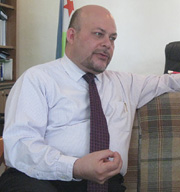From: Biniam Haile \(SWE\) (eritrea.lave@comhem.se)
Date: Tue Feb 10 2009 - 15:58:36 EST
DJIBOUTI: Global food crisis adding to shortages
Tuesday 10 February 2009
DJIBOUTI, 10 February 2009 (IRIN) - Drought, high food prices and a weak
response from donors have left a large proportion of Djibouti's
population without enough to eat, despite some level of economic growth,
the UN Resident Coordinator said.
"Djibouti has been suffering over the last few years, not only from the
drought situation that the Horn of Africa is facing, but it is also one
of the countries severely hit by the global food crisis," Sunil Saigal
said.
Of a population of between 500,000 and 700,000, an estimated 130,000
were highly food-insecure. This, however, is a significant drop from the
340,000 cited by the Famine Early Warning Systems Network (FEWS Net) in
September 2006.
"We don't quite know how many people are actually in Djibouti right
now," Saigal told IRIN in Djibouti. "[But] a very large percentage is
highly food-insecure. WFP [UN World Food Programme] is operating on the
basis of 328,000 moderately food-insecure."
The rural population was more affected because food prices had increased
by more than in urban areas. Over five years, prices had increased in
urban areas by 80 percent compared with 94 percent in rural areas.
"Between January 2007 and September 2008, the increase of the basic food
basket in urban areas was 62.4 percent and in rural areas 74 percent,"
he added. "So really the whole population has been severely hit."
The situation had been aggravated by a lack of adequate donor attention,
despite a good response from USAID, the European Union and the UN's
Central Emergency Response Fund, among others.
"But overall, the response from the international community has been
weak," the Resident Coordinator explained. "We issued jointly with the
government last July an appeal for the last six months of 2008 for
US$31.7 million ... we have a shortfall of about $20 million."
Among other impacts, the drought and food crisis had increased
malnutrition, despite government efforts to improve access to basic
services.
"We are looking at global malnutrition rates of 16 and 17 percent and in
the northwest of the country as high as 25 percent," Saigal said.
"WHO [the World Health Organization] considers the threshold for a
crisis to be 15 percent. We are well beyond the crisis situation and
that is what we are trying to respond to."
Djibouti, a semi-desert state that experiences frequent droughts and
imports all its staple foods, is classified by the UN as both a least
developed and a low-income, food-deficit country.
Years of minimal rains have left both rural and urban populations more
dependent on food imports due to poor pastoral and agro-pastoral
production while international commodity prices have risen steadily.
ah/eo/mw
http://www.irinnews.org/Report.aspx?ReportId=82847
<http://www.irinnews.org/images/2009/200902103.jpg>

----[This List to be used for Eritrea Related News Only]----